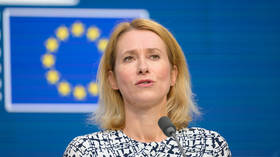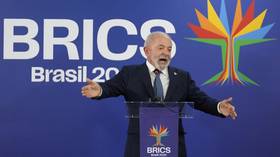EU Parliament head says Mussolini government did good things too, draws anger

The president of the European Parliament, Antonio Tajani, was again branded a secret fascist sympathizer after saying the government of Benito Mussolini did some good things for Italy.
The Italian EU politician offered some cautious praise to the policies of the notorious dictator and ally of Adolf Hitler during World War II when he appeared on a popular Radio 24 news show. Tajani acknowledged that Mussolini did a lot of terrible things – from joining forces with Nazi Germany, which was a suicidal move for Italy, to imposing anti-Jewish racial laws, to possibly being behind the assassination of his political opponent, Giacomo Matteotti, who was killed by members of the fascist secret police.
But, “he did positive things to realize infrastructures in our country,” Tajani said.
One must be objective. I’m not a fascist, I have never been a fascist and I don’t share his political thought, but if we must be honest, he built roads, bridges, buildings... he reclaimed many parts of our Italy.
Despite the hemming and hawing, many were angered by his words, including fellow EU officials. Some said he is secretly exactly what he said he is not – a fascist sympathizer.
Mussolini, he may be responsible for 430,000+ murders but hey check out his roads and bridges! 🤷♀️Seriously this is the President of the EU Parliament & member of @FineGael 's group @EPPGrouphttps://t.co/xEeMczS9IJ
— Lynn Boylan MEP (@LNBDublin) March 13, 2019
Unbelievable quotes from Tajani on #Mussolini. How can a President of the European Parliament fail to acknowledge the nature of fascism? We need swift clarification.
— Udo Bullmann (@UdoBullmann) March 13, 2019
Antifascism is fundamental to the European Union. With his comments about Mussolini, Antonio Tajani has again proven that he is not fit to be the President of the European Parliament.He should take them back or resign. https://t.co/Ha7M46ngNs
— Terry Reintke (@TerryReintke) March 14, 2019
A shocking statement from @EP_President today that Italian dictator Mussolini "did positive things also like buildings & infrastructure apart from the war & the alliance with Hitler..." #NoPasaranhttps://t.co/ZA4NnkNkbm#farright#fascismopic.twitter.com/fXNSaqoEQF
— The Left in the European Parliament (@GUENGL) March 13, 2019
This is pretty outrageous: Antonio Tajani, president of the European Parliament, praising Mussolini for "building roads, bridges, buildings." https://t.co/lzXRVPJsNepic.twitter.com/NzTA7swZBB
— Andrew Stroehlein (@astroehlein) March 14, 2019
Shameful! How is it possible to have a president praising Mussolini?! #TajaniResign@EP_President 👇👇👇👇 https://t.co/AdqpYtVfQV
— Ramon Tremosa 🎗🌹 (@ramontremosa) March 14, 2019
Tajani responded to the criticism, reiterating that he is anti-fascist and accusing critics of manipulating his words.
Shame on those who manipulate what I’ve allegedly said on fascism. I’ve always been a convinced anti-fascist, I will not allow anyone to suggest otherwise. The fascist dictatorship, racial laws and deaths it caused are the darkest page in Italian and European history.
— Antonio Tajani (@EP_President) March 13, 2019
The Italian politician saw a similar wave of accusations in February after he took part in a ceremony to commemorate the deaths of Italian soldiers killed by Yugoslav partisans during World War II. Some people, including the Slovenian president and prime minister, said the speeches delivered there, in which the killings were compared to ethnic cleansing, were “historical revisionism.”
Tajani immediately apologized for causing offence, saying he did not intend to hurt anyone’s feelings.
“In my speech, I wanted to highlight the path to peace and reconciliation between the Italian, Croatian and Slovenian peoples and their contribution to the European project,” he said in a statement.
Also on rt.com US-funded Ukrainian radio defends neo-Nazi group, deletes article when called outMussolini was one of many right-wing European political leaders who allied with Hitler’s Nazi Germany and ended up suffering the consequences. For him the choice proved fatal, after he was caught and summarily executed by Italian partisans. Others fared better. Spain’s Francisco Franco remained neutral in the war and remained in power till 1975 as a treasured NATO ally. Finland’s Carl Mannerheim maneuvered his country from fighting against the Soviet Union alongside the Nazis to signing a separate armistice and fighting a new war against retreating German troops.
Think your friends would be interested? Share this story!














